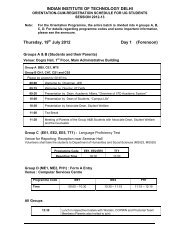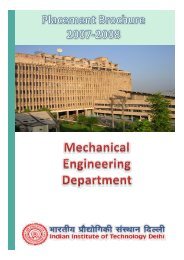Industrial Tribology and Maintenance Engineering - Training ...
Industrial Tribology and Maintenance Engineering - Training ...
Industrial Tribology and Maintenance Engineering - Training ...
You also want an ePaper? Increase the reach of your titles
YUMPU automatically turns print PDFs into web optimized ePapers that Google loves.
fatigue, shock, etc.) on nature of failures, Role of<br />
stress; processing <strong>and</strong> fabrication defects, Effect<br />
of residual stresses induced during fabrication<br />
processes, Influence of temperature <strong>and</strong><br />
environment on failure, Crack <strong>and</strong> subsurface<br />
crack like defects <strong>and</strong> their significance in<br />
failure.<br />
Micro mechanisms of failures; Ductile <strong>and</strong> brittle<br />
fracture, Fracture initiation <strong>and</strong> propagation,<br />
Fatigue failures, Wear related failures, High<br />
temperature failures, low temperature failures,<br />
etc., Studies <strong>and</strong> analysis of failed surfaces.<br />
Identification of failures, Techniques of failure<br />
analysis, Microscopic methods, Fracture<br />
mechanics techniques, Prediction of failures,<br />
Residual life assessment <strong>and</strong> life extension,<br />
Typical case studies in failure analysis, Logical<br />
fault finding <strong>and</strong> its application, Inspection <strong>and</strong><br />
safety measures, Repair techniques <strong>and</strong><br />
economic considerations, Failure analysis for<br />
design improvement <strong>and</strong> proactive<br />
maintenance,<br />
Studies.<br />
Design for repairbility, Case<br />
Computer Application in <strong>Maintenance</strong><br />
Management<br />
3 credits (2-0-2)<br />
Role of computer in maintenance management.<br />
<strong>Maintenance</strong> overview. Basics of software<br />
engineering. System analysis <strong>and</strong> design.<br />
Fundamentals of programming with specific<br />
emphasis of object oriented paradigms. Study of<br />
various available software <strong>and</strong> their<br />
implementation for maintenance. System<br />
analysis of various maintenance strategies,<br />
activities / modules <strong>and</strong> their implementation.<br />
Evaluation <strong>and</strong> optimum selection of<br />
computerised maintenance management<br />
system(CMMS), Knowledge based approach to<br />
Education @I.T.M.M.E.C<br />
maintenance management. Neural network for<br />
CMMS, Software consideration for design of<br />
CMMS, <strong>Maintenance</strong> through internet based<br />
technology. Case studies.<br />
Corrosion <strong>and</strong> its Control<br />
3 credits (3-0-0)<br />
Importance of corrosion control in industrial<br />
practices. Thermodynamics of corrosion. Zroad<br />
forms of corrosion - uniform, uneven, pitting,<br />
cracking, etc. Influencing factors on corrosion.<br />
Surface film. Polarisation <strong>and</strong> effects. Theory of<br />
passivity. Kinetics of corrosion.<br />
Various types of corrosion along with case<br />
studies - Galvanic, Thermogalavanic, High<br />
temperature corrosion. Intergranular, Pitting,<br />
Selective attack (leaching). Fretting corrosionerosion,<br />
Cavitation, Stress corrosion cracking.<br />
Hydrogen embrittlement.<br />
Corrosion fatigue <strong>and</strong> Corrosive wear.<br />
Application of Non Destructive Techniques<br />
(NDT) for corrosion evaluation <strong>and</strong> monitoring.<br />
Corrosion Control- Design improvement.<br />
Selection of material, fabrication processes for<br />
corrosion control. Role of residual stresses.<br />
Changes in operating conditions. Use of<br />
inhibitors. Anodic <strong>and</strong> cathodic protection.<br />
Corrosion resistant coatings. Case studies.<br />
Lubricants<br />
3 credits (2-0-2)<br />
Overview of friction, wear <strong>and</strong> lubrication,<br />
Primary role of lubricants in mitigation of<br />
friction <strong>and</strong> wear & heat transfer medium,<br />
Composition <strong>and</strong> properties of lubricant,<br />
Fundamentals - Mineral oil based liquid<br />
lubricants, Synthetic liquid lubricants, Solid






